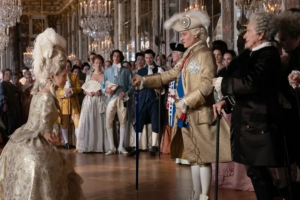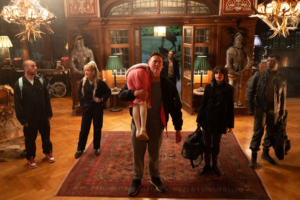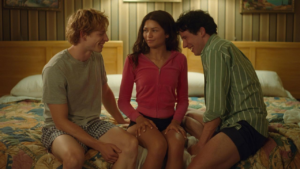Reviewed by GREG KING
Director: Michael Hoffman
Stars: James Marsden, Michelle Monaghan, Luke Bracey, Liana Liberato, Jon Tenney, Sean Bridgers, Sebastian Arcelus, Gerald McRaney, Caroline Goodall, Clark Peters.
The melodramatic The Best Of Me is the latest adaptation of a novel from Nicholas Sparks, a bestselling author best known for The Notebook. Sparks writes overly sentimental romantic novels to a well established and increasingly predictable formula – rain drenched passionate kisses and young lovers from different social classes kept apart by family, prejudice, death, war, or some other event – so it is easy to see where his stories about first love and passion are headed.
Here we meet oil rig worker Dawson (James Marsden) and Amanda (Michelle Monaghan), the bored wife of boorish but wealthy and distant husband Frank (Sebastian Arcelus). Former high school sweethearts they are summoned to the small Southern town where they lived and where, as teenagers, they had a passionate romance until events tore them apart. They are brought together again following the death of their mutual friend Tuck (Gerald McRaney, from Simon & Simon, Major Dad, etc). A lawyer contacts them and gives each of them a letter from Tuck which they are requested to read at their leisure.
The pair haven’t seen each other for over twenty years, and the tension and hurt between them is palpable. While sorting through Tuck’s possessions they briefly reconnect and again rekindle their passion. Over a weekend spent in the summer cottage where they once spent happier times they slowly begin to bond again and feel that same spark they did 20 years earlier. Until once again family issues and long forgotten secrets intrude, with tragic consequences.
A series of extended flashbacks takes us back to the 1990s and explores the developing relationship between the young couple and the events that tore them apart. Dawson (Australian actor Luke Bracey, from Home And Away, etc) is a boy from a white trash family with an abusive father (Sean Bridgers) who deals drugs, but he has lofty ambitions that place him at odds with his family. Amanda (Liana Liberato, from If I Stay, etc) comes from a rich family who frown upon any sort of relationship with the poor Dawson. After fleeing his family, Dawson finds a surrogate father figure in the kindly and protective Tuck, who encourages the relationship with Amanda, and gives them space to explore each other. But Dawson’s horrible family refuses to leave him alone, and his relationship with Amanda is jeopardised.
The role of the adult Dawson was originally intended for the late Paul Walker, and there are hints of Walker’s screen persona in Marsden’s look. The adult Amanda is played by Monaghan (Source Code, Gone Baby Gone, etc). Neither actor particularly resembles the younger version of themselves though, which makes it hard to emotionally engage with the characters. There is precious little chemistry between pair, and they deliver their turgid dialogue with a straight face. The strand following the couple as adults seems more strained and forced.
The younger versions of the character fare a little better, and there is a breathless urgency to their Romeo and Juliet like teenage romance. Of the two narrative strands, that following the young lovers is far more interesting and engaging. The hunky Bracey looks like a young Heath Ledger circa Two Hands at times, and he and Liberato develop a good rapport and chemistry that lifts the cliched material.
The director is Michael Hoffman, whose resume includes solid dramas like The Last Station and The Emperor’s Club, as well as the romance of One Fine Day, but his handling of the mawkish and overwrought material is workmanlike and shamelessly manipulative. The screenplay has been written by Will Fetters (the adaptation of another Sparks novel with The Lucky One, etc) and J Mills Goodloe (a former assistant to Richard Donner).
And the maudlin conclusion feels too contrived and Hoffman uses some misdirection to unbalance our expectations. While it may effectively reduce some to tears, it is too convenient and silly for words.
The Louisiana settings have been shot in gorgeous golden hued tones by Hoffman’s regular cinematographer Oliver Stapleton, giving the film a nice glossy visual surface.
The Best Of Me, which plays out in two time frames, is the ninth of Sparks’ novels to be given the big screen treatment, but it is also one of the lesser adaptations of his work. His formula is growing tired, and this lacklustre effort is far from the best of Sparks’ work. Nonetheless, like much of Sparks’ romantic output about doomed love affairs, The Best Of Me is the perfect Saturday night date movie.
★★☆




